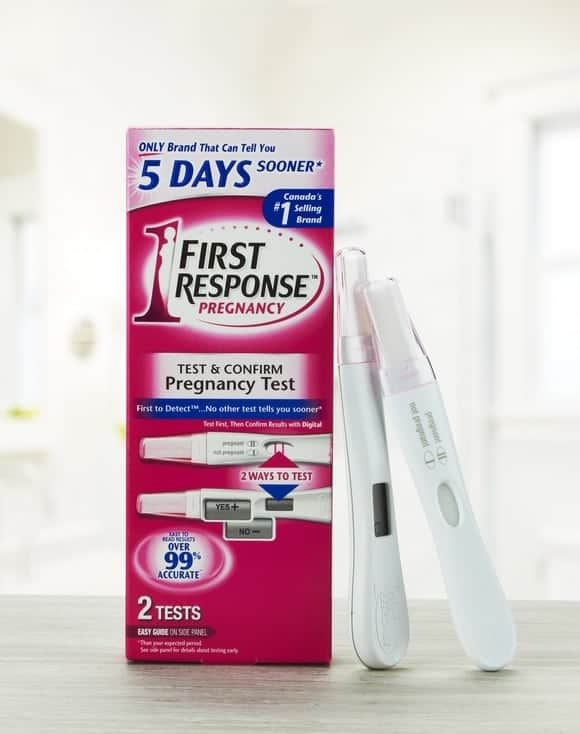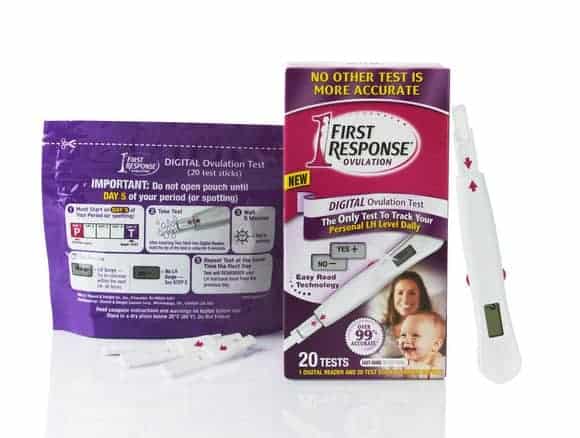This post about common misconceptions about conceptions is brought to you by First Response.

First Response and the Yale School of Medicine joined together to conduct a study about the misconceptions about conception. The study revealed some interesting information about how women perceive their fertility. While I thought I knew pretty much everything about fertility, I admit that one of the misconceptions surprised me! I’ll tell you which one in a minute.
Major Findings of the First Response and Yale Study
Before getting into the misconceptions, Yale and First Response gauged the general concerns that women have regarding conception. They found that:
- 40% of women across all age groups expressed concern about their ability to conceive.
- Over one-quarter of women surveyed were unaware of the adverse implications of sexually transmitted infections, obesity or smoking on fertility.
- 75% of those surveyed said they get their information about reproductive health from a healthcare professional, 40% said they get their information about sexual reproductive health online.
Interestingly, the study also revealed the following misconceptions in regards to the reproductive health of women:
Misconceptions About Conception
- 6 out of 10 women surveyed perceived that intercourse should be timed after ovulation (instead of before) to maximize chances of conception.
- 41% of women believed that their ovaries continue to make new eggs.
- 51% of women believe that having sex more than once per day increases chances of getting pregnant. (This is the one I thought was kind of true)
- 30% of women were unaware that exposure to an STI may affect fertility.

Today there are many tools to help women better track and understand their reproductive health and detect pregnancy sooner. Only the First Response(tm) Digital Ovulation Test tracks your unique hormone levels, maximizing your chances of becoming pregnant. Knowing the timing of your ovulation goes a long way to helping you conceive. See, most women assume that they ovulate right in the middle of the cycle. While this is typically true, many women ovulate earlier or later. I always ovulated much earlier.
When you think you might be pregnant, every day matters. With First to Detect(tm) enhanced technology, First Response(tm) can detect the pregnancy hormone 5 days before your expected period – no other test can do this. First Response was actually the test that confirmed I was pregnant with my son! I still have that stick in a “treasure box.” Yes, I know that sounds weird, but it took me six years to get that second line!
Providing accuracy ratings of over 99% with both of these tools, you can feel confident in the accuracy of your results. Whether you’ve been trying for a while or are just starting out on the road to conception, knowing you can count on the results of your ovulation and pregnancy test is a definite plus!
Did you have any of these misconceptions about conception? Which one surprised you most?


It is nice to see how developed the area of conception noways, implications always exist and misconceptions have to be learned about.
Wow, I guess I also believed in those before I really looked into it as an adult. Sex ed at my school was terrible!
Thanks for sharing! I wish that there was some knowledge of this during sex ed in the schools. When we first started trying I was amazed that I didn’t get pregnant on the first try :)
Things have come so far since I was pregnant with my kids a long time ago. I talked to my doctor whenever I had any questions about conception.
This sounds great for those needing peace of mind. It’s amazing how far with technology pregnancy tests have come!
This is good to know as we consider a possible baby number three! :)
This was what I used when I found out I was pregnant with my toddler. They do work because I was able to tell before I went to my doc.
Got to use a quality pregnancy test! Simple and easy to use!
It’s very advanced in what it can do. I’m pretty impressed by all it can discern.
Wow, those tests really have improved! it’s also great to see that there’s such a concerted effort to provide education–to make sure the facts get out there (and all those old wive’s tales don’t continue to confuse and frustrate all those couples who are anxiously hoping to conceive.
I loved how easy these ovulation tests were… I didn’t have issues conceiving, but I was obsessed with it and these really helped tell me.
Wow, lots of interesting facts here. Thanks for sharing.
I was lucky enough to not have to be too informed about conception. It was pretty basic for me. But having three daughters, it’s important for me to know some of the “misconceptions” out there. And, I agree with you…I would have figured more sex meant more chance of getting pregnant?! :)
Oh I am very familiar with this brand, I have 5 children. Definitely a brand I can trust!
I had a ton of misconceptions. Then I started a road of infertility and learned a lot fast.
I would have thought that having sex more than once a day would increase your chance of getting pregnant. Learn something new every day!
Loved the digital tests!
When I was pregnant with my last I used a ton of them.
I had 2 early miscarriages and seeing that glorious word “pregnant” helped sooth my fears.
They were reliable, fast and I knew that I could always count on them.
This is good information to know! First Response was one of my fav pregnancy test brands…always reliable!
I was fortunate not to have to take these tests, my husband always says i took out the fun of trying to get pregnant but I know manyfrends who have used these.
I remember the days of taking pregnancy tests. I’ll never forget the two times they came back positive and our lives changed forever!
What a great post! I had all of those misconceptions. It’s amazing what you can learn.
My OB/GYN said to conceive that I should start having sex at day 10 of my cycle and do it every 2 days until day 18. It worked.